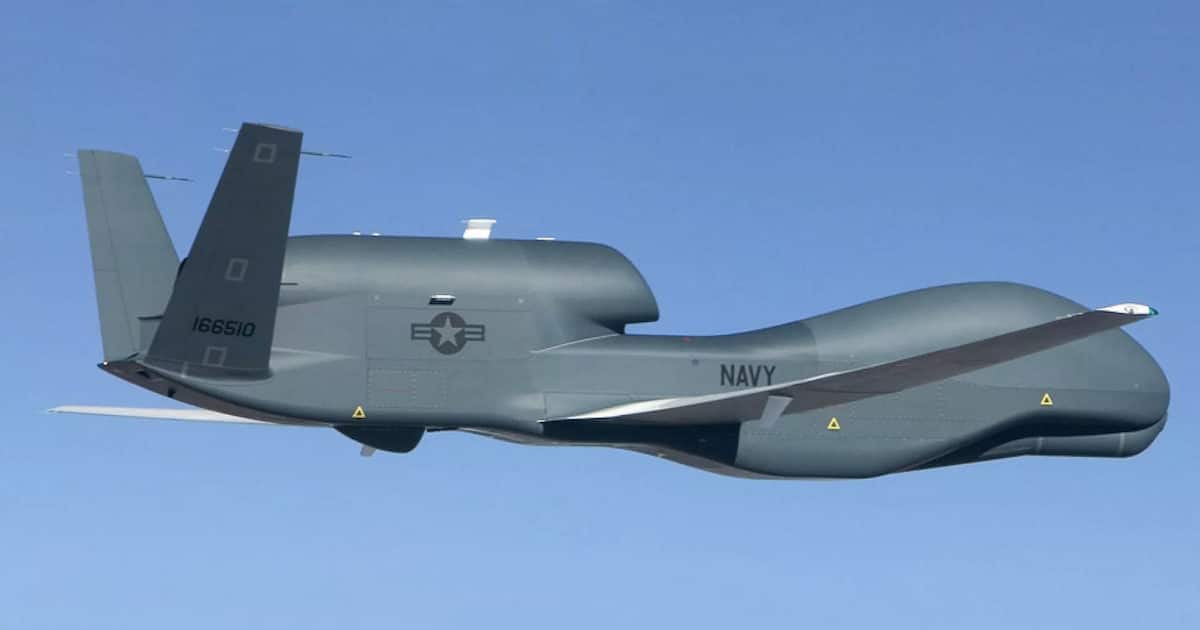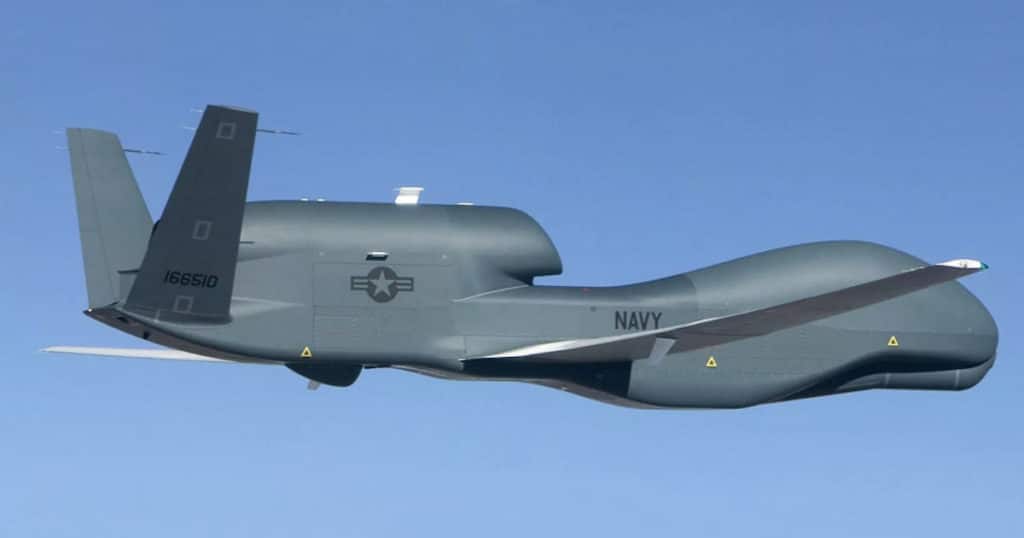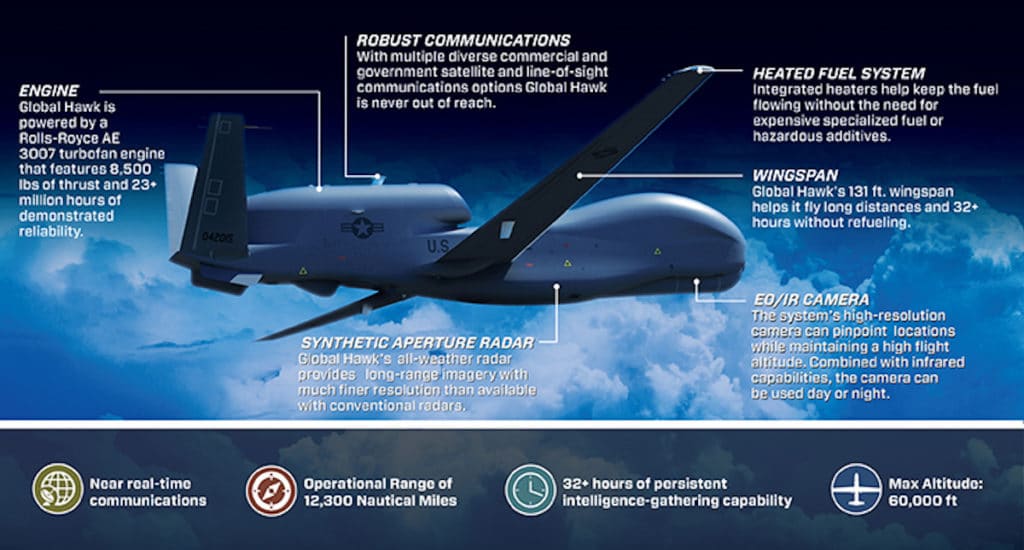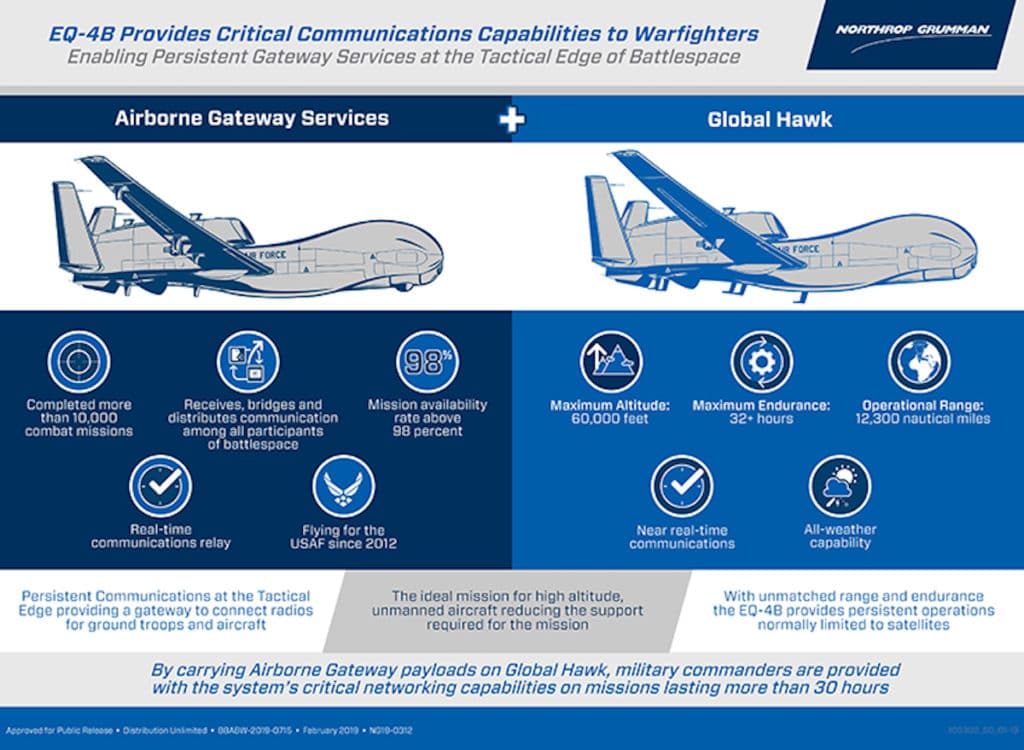
What Did Iran Use to Shoot Down the U.S. Navy Drone?

A U.S. Navy RQ-4A Global Hawk High-Altitude Long Endurance (HALE) Unmanned Aircraft System (UAS) — known as a BAMS-D — was shot down by an Iranian surface-to-air missile. It provides real-time intelligence and surveillance and reconnaissance missions (ISR) over vast ocean and coastal regions.
U.S. Central Command claims Iran shot down the high-altitude U.S. Navy drone operating while it was in international airspace over the Strait of Hormuz at approximately 7:35 p.m. EST on Wednesday.
Iran claims it was shot down in their airspace at around 4:05 a.m. on Thursday morning, near the Kouhmobarak district in southern Iran’s Hormozgan province, located roughly 750 miles southeast of Tehran.
The Islamic Revolutionary Guard Corps (IRGC) used the air defense system known as Third of Khordad to shoot down the U.S. Navy drone. The truck-based missile system has a range of up to 18 miles (30 kilometers).
The Global Hawk is a $180 million piece of military equipment manufactured by Northrop Grumman Corporation (NOC). It has a maximum altitude of 60,000 feet, a maximum endurance of 32 hours and a range of 12,300 nautical miles.
According to Northrop Grumman, the RQ-4A Global Hawk has more than 250,000 flight hours and has flown military missions in Iraq, Afghanistan, North Africa, and the greater Asia-Pacific region. It was first put into active operation for the U.S. Air Force in 2001.

While designed for military service, the same intelligence-gathering capabilities are also useful to civil authorities responding to natural disasters, search-and-rescue operations, as well as weather and atmospheric data collection for forecasting the paths of storms.

IRGC General Hossein Salami said the action “sends a clear message” they are “fully ready for war.”
“We do not have any intention for war with any country, but we are fully ready for war,” Gen. Hossein Salami said.
U.S. Air Force Lt. General Joseph Guastella said during a video statement last week it was an “unprovoked attack” meant to hinder surveillance capabilities amid recent threats to international commerce.
“This was an unprovoked attack on a U.S. surveillance asset that had not violated Iranian airspace at any time during its mission,” Lt. General Guastella said.
“This attack is an attempt to disrupt our ability to monitor the area following recent threats to international shipping and free flow of commerce.”
Last week, the increasingly desperate and economically-crippled regime attacked two oil tankers. The U.S. Navy RQ-4A Global Hawk was on an ISR.








slope / August 7, 2024
So alternative drone is not yet available but already asking to retire this one… weird request, as if somebody is making some bucks on the new project
/
duck life / August 19, 2024
It’s strange that they’re already talking about retiring this drone when a replacement isn’t available. Makes me wonder if there’s a financial incentive for the new project.
/
hebemiley / August 21, 2024
Great device! New innovation for a new world in the future! I will start researching What Beats Rock!
/
Clement / September 5, 2024
Serving clients at papa’s scooperia primarily entails processing orders, choosing ingredients, and decorating ice cream cups.
/
2048 cupcakes / September 22, 2024
You should spend your best youth, your most wonderful youth, 2048 cupcakes for your dreams
/
Krista S. Barth / October 26, 2024
Discover the RQ-4A Global Hawk drone, a marvel of aerial technology known for its advanced reconnaissance capabilities. Similar to mastering strategy in slope unblocked, the Global Hawk navigates complex missions with precision. Its long-range surveillance and data gathering redefine modern intelligence operations.
/
slope / November 13, 2024
Your articles have helped me to learn a lot of interesting information on this topic and they are important material from which I can come up with many good ideas.
/
Lucinda / November 18, 2024
Although it is difficult to create such a drone, I believe that peace and a ceasefire are preferable to conflict. Retro bowl 2 game.
/
isadoraabhaya / December 4, 2024
Have you ever thought about what you’d do if the child you’re keeping wasn’t a normal child? In the baby in yellow you’ll experience that. With each new chapter, you’ll discover more about the mystery behind this child’s naive eyes and the strange events that happen around them.
/